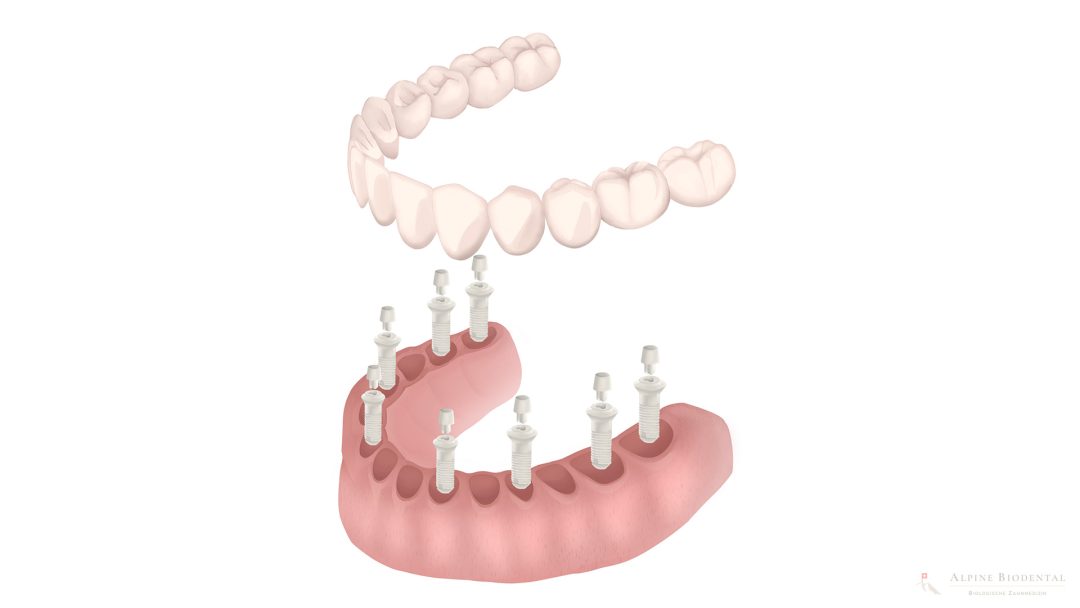All-on-8

All-on-8 stands for the restoration of an edentulous patient with eight dental implants per jaw. Such a fixed restoration can be performed with either titanium or ceramic implants.
Procedure for All-on-8
A total of 8 ceramic implants are placed in the edentulous jaw. Immediately after implantation, the patient receives fixed long-term provisional restorations made of plastic that should not differ visually from natural teeth. After approximately three months, the provisionals are replaced with ceramic bridges.
Advantages
- All-on-8 is possible with ceramic implants, which is preferable from a health and biological perspective.
- It leads to a balanced loading of the bone and an even distribution of forces on the implants.
- Since a fixed dental prosthesis can be avoided, there is no blocking of bone sutures.
- The concept can be executed as quickly as the All-on-4 concept. The patient receives fixed teeth on the same day.
- There is much less bone resorption, as the bone is stabilized by the eight implants.
- Laboratory-made ceramic bridges offer excellent aesthetics and a natural appearance.
- Ceramic bridges do not cause a foreign body sensation in the mouth, as is often the case with a fixed dental prosthesis.
- Due to the graceful and anatomically correct form, there are no speech restrictions.
- The patient is provided with a gap-free, fully ceramic dental prosthesis, offering ideal hygienic conditions. The connection is through cementation, like a natural tooth, and not through screwing.
- Better longevity and prognosis
Disadvantages
- The more implants placed, the higher the cost. Consequently, the patient can expect higher expenses.
- The surgery takes longer than with four implants per jaw.
Do we recommend the All-on-8 concept?
Yes. In our opinion, All-on-8 offers significant advantages over All-on-4, resulting in a substantial improvement in quality of life.
With extensive experience in treating edentulous patients, we can quickly and effectively perform the All-on-8 method. The patient receives the laboratory-made, fixed long-term provisional restoration on the same day and leaves with teeth.
Some edentulous patients wish to replace every missing tooth with a ceramic implant. This approach would require the placement of 12 or 14 dental implants per jaw. This can further enhance chewing comfort and dental aesthetics. As all areas of bone and gums are supported by an implant, the best possible outcome can be achieved.
Special form of All-on-8 – One Implant for Each Tooth
To ensure a high-quality, fixed dental restoration, a minimum of eight implants per jaw is necessary.
At the request of patients and if the jawbone allows, each lost tooth can be replaced by a ceramic implant. This way, the original anatomical situation can be perfectly and uncompromisingly restored.
From an anatomical, stability, chewing comfort, and aesthetic standpoint, this approach is superior to all others. All areas of the jawbone and gums are supported by the ceramic implants, as nature intended with natural teeth.
The only drawback is the increasing cost, as this approach would require the placement of 12 or 14 dental implants per jaw.
Dr. Tobias Steinherr M. Sc.
With All-on-8, stable and durable fixed teeth can be achieved. Our experienced experts are happy to assist you.

Frequently asked Questions about All-on-8
If you want to avoid a removable prosthesis to maintain your quality of life, you likely have some questions on the topic. We try to answer common questions here.
In general, you can estimate approximately 5,000 to 6,000 CHF per implant.
Yes. On the day of the operation, the patient receives a laboratory-made provisional set of teeth made of plastic.
The patient will receive the final ceramic restoration approximately 3 months after the implantation.
Yes, we offer rehabilitations with ceramic implants under general anesthesia as well.
Yes. Each tooth can be replaced by an implant, achieving the ideal result. However, this approach is associated with higher costs.
Further information
The following are relevant details that aim to provide you with more insight into the topic: